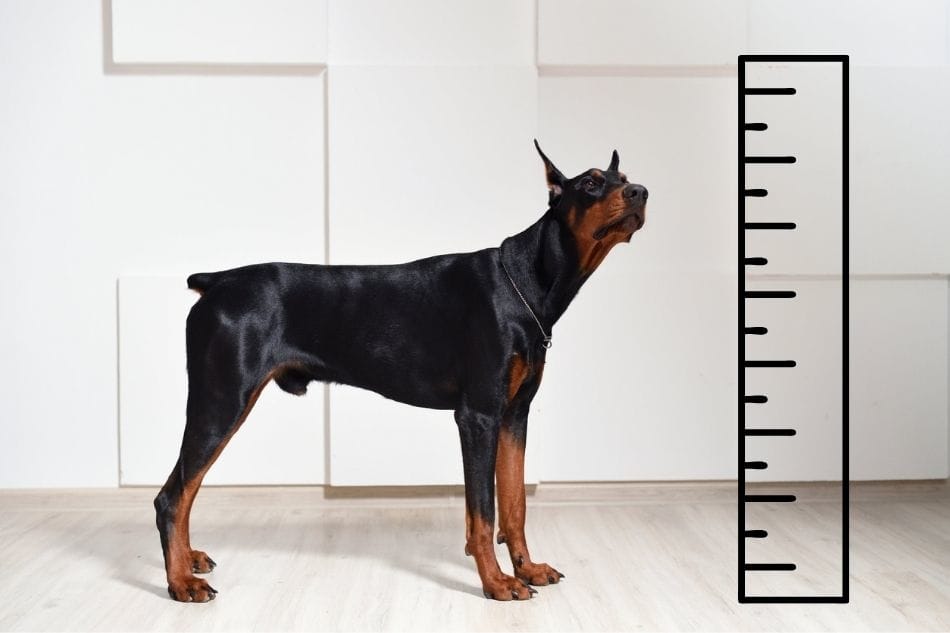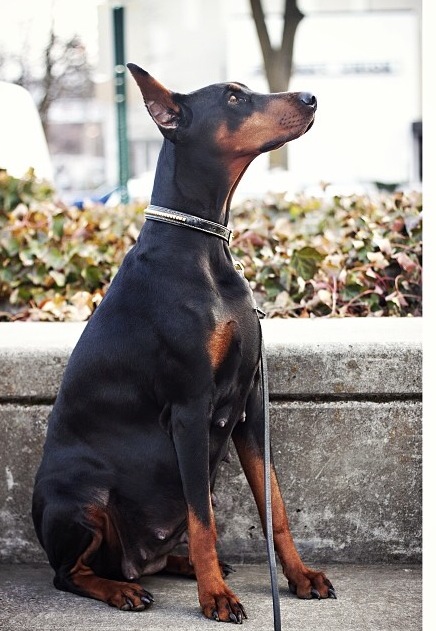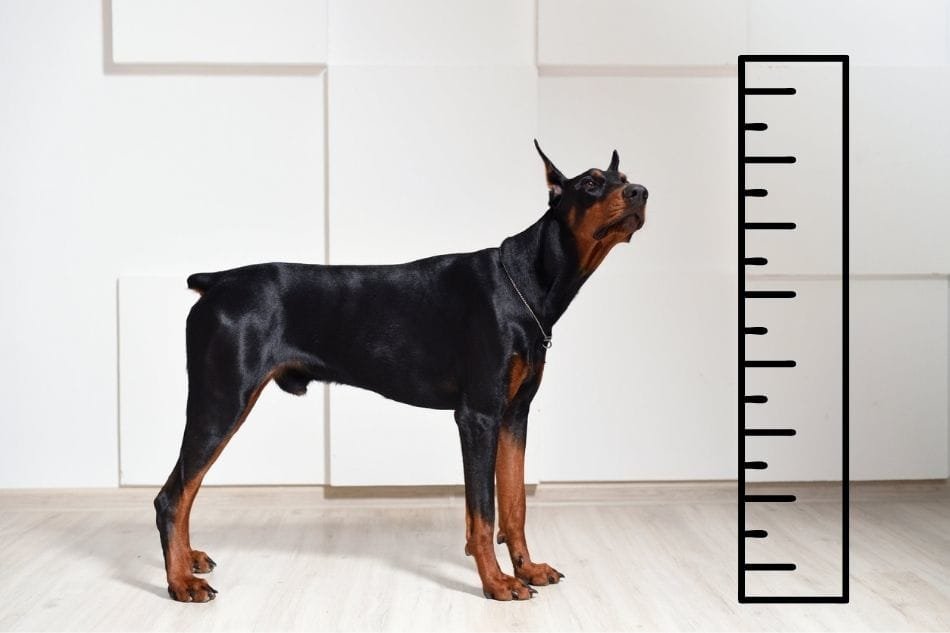When does a Doberman stop being a puppy? It’s an intriguing question that many dog owners and enthusiasts may ponder. As these beautiful and intelligent dogs grow, there comes a point when they transition from playful puppies to mature adults. Understanding when this transition occurs is important for their training, socialization, and overall care.
The age at which a Doberman stops being a puppy can vary. Typically, they are considered puppies until they reach around 1 year old. However, it’s important to note that individual Dobermans may mature at slightly different rates. Some may exhibit more adult-like behavior sooner, while others may retain puppy-like characteristics for a bit longer. It’s crucial for owners to observe their Doberman’s behavior and consult with a veterinarian to determine when they have reached adulthood.
A Doberman typically stops being a puppy around 1 to 2 years of age. This is when they reach their full size and maturity. However, it’s important to note that individual Dobermans may mature at different rates. During this time, it’s crucial to focus on continued training and socialization to ensure they grow into well-behaved and balanced adults. Remember, every Doberman is unique, so be patient and enjoy the journey!

When Does a Doberman Stop Being a Puppy?
A Doberman is a beloved breed known for its loyalty, intelligence, and protective nature. As a puppy, they bring joy and excitement to their owners. However, there comes a time when a Doberman transitions from being a cute little pup to a mature adult. In this article, we will explore when a Doberman stops being a puppy and what changes accompany this important milestone.
1. Physical Maturity
Physical maturity is one aspect that indicates when a Doberman stops being a puppy. Generally, Dobermans reach their full physical development between the ages of 18 months to 2 years. During this time, you will notice significant changes in their appearance. They will attain their adult size, weight, and muscular build. The rapid growth phase will slow down, and they will have a more defined body structure.
One of the visible signs of physical maturity in Dobermans is the closure of growth plates. Growth plates are areas of developing cartilage located at the ends of long bones, and they are responsible for bone elongation until maturity. Once these growth plates close, usually around 12-24 months, it indicates that the dog has reached its adult size.
The physical maturity of a Doberman is accompanied by other changes such as the development of a full adult coat, which may differ in color and texture from their puppy coat. Their facial features and body proportions will become more defined, giving them a mature and distinguished appearance.
2. Behavioral Changes
Along with physical changes, there will be noticeable behavioral changes that indicate when a Doberman stops being a puppy. As they transition into adulthood, they will become calmer and more composed. The puppy-like hyperactivity and rambunctiousness will diminish, and they will exhibit a more mature and balanced temperament.
Dobermans are known for their protective nature, and as they mature, this instinct becomes more pronounced. They will become more alert and vigilant, exhibiting a stronger sense of territory and guarding behavior. Their protective instincts make them excellent family dogs and guardians.
Additionally, as they grow older, Dobermans tend to become more independent. They will display a sense of confidence and self-assurance, which can also make them more stubborn at times. Training and socialization during their puppyhood will play a vital role in shaping their behavior as they transition into adulthood.
3. Mental and Emotional Development
Another aspect of when a Doberman stops being a puppy is their mental and emotional development. As they mature, they will exhibit increased intelligence and problem-solving abilities. Their ability to understand and respond to commands and training will improve, making them easier to train.
Dobermans are known for their loyalty and bond with their owners. This loyalty becomes more profound as they transition from being a puppy to an adult. They will develop a deeper emotional connection with their family and will be more attuned to their emotions and needs. Their affectionate nature will continue to shine through, and they will seek out opportunities to be close to their loved ones.
4. Care and Training Adjustments
As a Doberman stops being a puppy, adjustments in care and training become necessary to cater to their changing needs. Here are some considerations:
- Diet: A Doberman’s nutritional needs change as they transition from puppyhood to adulthood. Consult with your veterinarian to ensure they are receiving a balanced diet appropriate for their age and activity level.
- Exercise: Dobermans are an active breed, and their exercise needs remain important as they grow older. Adjust their exercise routine to provide mental stimulation and physical activity that suits their energy levels.
- Training: While it’s important to start training during puppyhood, ongoing training and reinforcement are crucial as they mature. Focus on reinforcing obedience commands, socialization, and addressing any behavior issues that may arise.
- Healthcare: Regular veterinary check-ups and preventive healthcare measures such as vaccinations, parasite control, and dental care are essential for their overall well-being.
5. Lifespan and Aging
A Doberman’s lifespan is typically around 10-13 years. While they may stop being a puppy around 2 years of age, they continue to age and enter their senior years after around 7-8 years. Senior Dobermans require extra care, such as monitoring their health closely, managing any age-related conditions, and providing them with a comfortable and safe environment.
6. Transitioning into a Lifelong Companion
When a Doberman stops being a puppy, they are ready to transition into a lifelong companion. It is a rewarding phase for both the dog and their owner. The bond and trust built during their formative years continue to strengthen, and you can enjoy the companionship, loyalty, and love that a mature Doberman offers.
7. Breed-Specific Considerations
It’s important to note that while the general timelines mentioned in this article apply to most Dobermans, individual dogs may vary. Some Dobermans may reach physical and behavioral maturity sooner or later than average. Factors such as genetics, diet, exercise, and overall health can influence their development. Consulting with a reputable breeder or a veterinarian can provide more specific guidance based on your Doberman’s unique characteristics.
8. The Role of Responsible Ownership
Responsible ownership plays a crucial role at every stage of a Doberman’s life, including when they stop being a puppy. Providing proper care, training, socialization, and a loving environment are important for their well-being. Remember to always prioritize their health and happiness, and you will enjoy a fulfilling and enriching relationship with your Doberman.
9. Lifelong Learning and Adaptation
As your Doberman grows and matures, it’s important to continue learning and adapting to their changing needs. Stay informed about the latest training techniques, health recommendations, and advancements in Doberman care. By staying proactive and invested in their well-being, you can ensure a happy and healthy life for your beloved Doberman.
10. Embracing the Journey
Transitioning from a puppy to an adult is an important milestone in a Doberman’s life. Embrace this journey with love, patience, and understanding. Cherish the unique qualities and character of your Doberman as they grow older, and enjoy the many wonderful moments you will share together.
When Does a Doberman Stop Being a Puppy? – Answer
A Doberman typically stops being a puppy between the ages of 18 months to 2 years. This is when they reach physical maturity, with their growth plates closed and their appearance fully developed. Along with physical changes, there are noticeable behavioral shifts as they become calmer and more composed. Their mental and emotional development progresses, making them more intelligent, loyal, and emotionally connected to their family. Adjustments in care and training become necessary to cater to their changing needs. It’s important to note that individual Dobermans may vary in their development timeline, so consulting with a breeder or veterinarian is recommended for personalized guidance. Embracing the journey, from puppyhood to adulthood, will allow you to fully appreciate the unique qualities and companionship that a Doberman offers.
Key Takeaways:
1. A Doberman typically stops being a puppy around 1 to 2 years of age.
2. Their growth rate slows down after reaching adulthood.
3. Physical and behavioral changes indicate the transition from puppyhood.
4. Training and socialization are crucial during this stage of development.
5. It’s important to provide proper care and attention as your Doberman grows.
Frequently Asked Questions
Are you curious about when a Doberman stops being a puppy? Here are some common questions and answers to give you a better understanding of this topic.
1. At what age does a Doberman stop being a puppy?
In general, a Doberman is considered a puppy until they reach the age of 1 year. During this time, they go through various stages of development and growth. It’s important to provide them with appropriate care, training, and socialization during this critical period.
Once a Doberman reaches the age of 1, they are considered an adult. They have typically reached their full size and physical maturity. However, they may still exhibit some puppy-like behaviors and will continue to learn and develop throughout their lives.
2. What changes can I expect when my Doberman stops being a puppy?
When a Doberman stops being a puppy and enters adulthood, you may notice several changes in their behavior and physical appearance. Here are some common changes:
Behavior: Adult Dobermans tend to be more consistent in their behavior and less impulsive compared to puppies. They may become more focused, attentive, and calm. Additionally, they may become more protective of their family and home.
Physical Appearance: By the time a Doberman becomes an adult, they have typically reached their full size and weight. Their coat may also become denser and more glossy. They may appear more muscular and have a more defined body structure.
3. Does a Doberman’s energy level decrease after they stop being a puppy?
While the energy level of a Doberman may decrease slightly as they transition from puppyhood to adulthood, they are still an active and energetic breed. Dobermans generally require regular exercise and mental stimulation to stay happy and healthy.
It’s important to continue providing your adult Doberman with outlets for physical exercise and mental stimulation. This can include activities such as daily walks, interactive play sessions, and training sessions. Regular exercise helps prevent behavioral issues and keeps your Doberman engaged and content.
4. Can I continue training my Doberman after they stop being a puppy?
Absolutely! Training is a lifelong process for any dog, including Dobermans. While it’s crucial to establish a solid foundation of training during the puppy stage, you can continue to train your adult Doberman to further enhance their skills and behavior.
Training sessions can help reinforce obedience, strengthen the bond between you and your Doberman, and keep them mentally stimulated. It’s important to use positive reinforcement techniques and consistency in training to achieve the best results.
5. Are there any health concerns to be aware of when a Doberman stops being a puppy?
As Dobermans transition from puppyhood to adulthood, there are certain health concerns that may become more prominent. Here are a few key health considerations:
Joint and Bone Health: Dobermans are prone to certain orthopedic issues, such as hip dysplasia and osteoarthritis. Regular exercise, a balanced diet, and appropriate supplementation can help support their joint and bone health.
Heart Health: Dobermans are also susceptible to certain heart conditions, such as dilated cardiomyopathy. Regular veterinary check-ups, a heart-healthy diet, and exercise can help maintain their heart health.

Doberman Puppy 101: What to Expect Each Month Raising a Doberman
In summary, a Doberman stops being a puppy between 12 to 18 months of age.
During this time, they go through important physical and behavioral changes, transitioning into adulthood.
